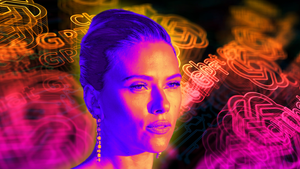How performers protect their voices in the context of AI is back in the spotlight thanks to a dispute between movie star Scarlett Johansson and ChatGPT developer OpenAI. She says she was approached by OpenAI boss Sam Altman last year about working on the creation of an AI voice. She declined but has now discovered that one of the five AI assistant voices offered by ChatGPT sounds very like her. Though, OpenAI insists, that's just a coincidence.
Altman last year told Johansson that by providing her voice for a ChatGPT AI assistance she could "bridge the gap between tech companies and creatives" and "help consumers to feel comfortable", the actor said in a statement yesterday. She declined to get involved but - she added - friends, family and the general public have all since noted that the ChatGPT voice assistant called Sky "sounded like me".
Saying she was "shocked" and "angered" that Altman would create an AI voice "so eerily similar to mine", she also noted that the OpenAI boss himself seemingly acknowledged the similarity in a post on X. Last week - as the Sky voice was used in a live demonstration - he posted the single word "her", seemingly referring to the 2013 film 'Her', in which a character played by Joaquin Phoenix develops an intimate relationship with an AI virtual assistant played by Johansson.
Although, in response to Johansson's statement, OpenAI suspended use of the Sky voice, the AI company nevertheless denies any wrongdoing. Altman told reporters, "The voice of Sky is not Scarlett Johansson's and it was never intended to resemble hers. Out of respect for Ms Johansson, we have paused using Sky's voice in our products. We are sorry to Ms Johansson that we didn't communicate better".
In a blog post, the company says, "In September of 2023, we introduced voice capabilities to give users another way to interact with ChatGPT. Since then, we are encouraged by the way users have responded to the feature and the individual voices. Each of the voices - Breeze, Cove, Ember, Juniper and Sky - are sampled from voice actors we partnered with to create them".
"We believe that AI voices should not deliberately mimic a celebrity's distinctive voice", it adds. "Sky’s voice is not an imitation of Scarlett Johansson but belongs to a different professional actress using her own natural speaking voice. To protect their privacy, we cannot share the names of our voice talents".
Nevertheless, Johansson said in her statement that her lawyers had now written to Altman and OpenAI seeking clarity on the "exact process" the company went through in creating the Sky voice. She added, "In a time when we are all grappling with deepfakes and the protection of our likeness, our own work, our own identities, I believe these are questions that deserve absolute clarity".
The creative industries, including the music industry, have been very vocal about the need for clear legal protections for performers - and people more generally - to stop the use of their voice and likeness in the training of generative AI.
Copyright can help to an extent, but it is widely agreed that a strong personality right is also needed. That right doesn't currently exist in the UK and, in the US, only exists at a state level. Though a US-wide federal publicity right has been proposed in US Congress.
Copyright owners also want AI companies to have strong transparency obligations so that they declare what content has been used to train any one AI model.
Such transparency will allow creators and performers to identify if their work, voice or likeness has been exploited, especially where similarities appear and AI companies inevitably argue those similarities are a coincidence.
Though, where creators and performers are being hired specifically to work on the training of AI models - as is seemingly the case here - would those transparency obligations force that work to be publicly declared? If not, they wouldn't necessarily help Johansson in this dispute.

